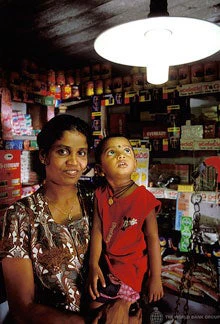
RBAs have been adopted in numerous health and water projects, where expansion of access to a service—typically an immunization, an attended birth, a water connection—is the key indicator.
But RBAs are more scarce in the energy sector.
Why? Is the energy sector too complex? Are energy business models too diverse? Is there a results-based model that could work in the energy sector?
These questions were the focus of discussion on May 7, when practitioners from the World Bank, partner governments and agencies gathered in Washington for the opening day of a three-day symposium on RBAs, access to electricity and clean fuels, and renewable energy resource mapping.
This “Knowledge Exchange Forum” is an annual event organized by the Energy Sector Management Assistance Program, or ESMAP, a trust fund supported by 13 donor countries that helps low- and middle-income countries develop and implement sustainable energy policies. As part of ESMAP’s own results focus, the first day of its forum was devoted to a series of discussions on how results-based approaches have been used, by Bank project teams and others in the health sector, on road construction and maintenance, in ICT development and the water sector.
The goal was to see what lessons these experiences might hold for the energy sector.
“Keep it simple” seemed the main takeaway piece of advice for project managers or task team leaders faced with managing a results-based project. “Pick a few things in the portfolio that are simple, and that generate excitement in the government,” advised Nancy Birdsall, president of the Center for Global Development and co-author of Cash on Delivery – A new approach to foreign aid.
Birdsall said RBAs—both output-based aid, in which development aid grants are paid after specified outcomes are delivered, and results-based financing, in which a government pays an agency upon delivery of specified outcomes—offer both short- and long-term advantages. For the short-term, she said, “they deliver better lives now.” And for the longer-term, “they help transform the state and society by making recipient governments accountable to their own citizens instead of donors.”
This fulsome praise for RBAs was supported by other presenters at the workshop, notably Benjamin Loevinsohn, Lead Health Specialist for the Bank in Africa, who showed that performance-based programs delivered dramatic improvements in vaccinations, attended births and curative care in Cambodia and Burundi.
At the closing panel, however, energy experts were cautious about the extent to which these RBA experiences can be replicated to expand access to electricity, or increase renewable energy and encourage enhanced energy efficiency.
“I’m optimistic about the concepts we’ve heard about, on contract design, indicators, and technique,” said Kilian Reiche, lead adviser at the Africa Electrification Initiative. “But I am less optimistic that we can apply RBAs to achieve the level of scale-up that the Sustainable Energy for All initiative proposes.”
That initiative, which the Bank has placed at the centre of its energy agenda, seeks to achieve universal access to electricity by 2030, which means providing access to 1.3 billion people who are currently without it. Reiche and others noted that the key players in rural electrification, especially off-grid, are typically small, local companies that don’t have the equity or access to debt financing needed to make the upfront investments that RBAs require.
For on-grid energy projects, RBAs pose even greater challenges. Luis Tineo, senior operations officer at the Global Program for Output-Based Aid, noted that only one of GPOBA’s eleven energy projects was on-grid. Juan Manuel Rojas, of the Argentina-based energy company Bridas, suggested that this scarcity of RBAs for on-grid renewable energy projects is likely due to the fact that these, “have to compete with the core business of conventional energy…any company providing wind turbines is going to want upfront payments, and this places a severe constraint.”
As Nancy Birdsall said, success with RBAs rides heavily on defining a “simple outcome” to be achieved. The challenge in energy, however, is that while the outcome of access to electricity delivered from low-carbon sources may seem simple, the paths to get there are many, and often bewilderingly complex.
Photo: Solar energy lights a shop in Sri Lanka. ©Dominic Sansoni / World Bank


Join the Conversation